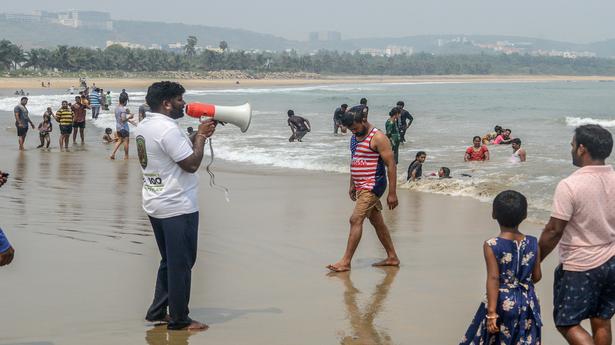
Visakhapatnams beaches may turn dangerous, as contract for Community Guards not renewed
The Hindu
Issue will be sorted out in a month, says GVMC Commissioner
Now, visitors going to local beaches may need to be extra cautious while taking a dip in the sea as it is curtains down for the Community Guards (CG), who saved hundreds of people from drowning in the past.
About 38 CGs, who were manning R.K Beach, Rushikonda, Yarada and a few other dangerous stretches, were told to go as the contract with the Greater Visakhapatnam Municipal Corporation (GVMC) was not renewed. This is probably for the first time since the year 2012, that the local beaches are left unguarded, posing a serious threat to the visitors.
During the year 2012, it was the then Police Commissioner J. Purnachandra Rao, who initiated the concept of CGs. Though the main aim was to enhance safety and security to the beach visitors, it also provided employment to the youth. The CGs have saved hundreds of lives at the beaches since then.
The number of visitors to beaches, especially to R.K Beach and Rushikonda, have increased over the past few years. Approximately, 4,000 people visit Rushikonda Beach during weekends and on public holidays. In the last four years, over 220 people reportedly drowned in Visakhapatnam.
Some of the CGs said that the issue has political touch and their contract was not renewed, since many of them were appointed during the Telugu Desam Party (TDP) government.
A former Community Guard said that some of the YSRCP corporators have raised objections to the continuation of their contracts and release of salaries, as they opine that some of them were appointed in an unauthorised manner without evaluating life-saving and swimming skills.
“We have contacted the GVMC officials, police and the District Collector, none of them helped. Our salaries were not paid on time. We were also not provided any special life saving gear. We adjusted them within our salaries only,” he said.

“Writing, in general, is a very solitary process,” says Yauvanika Chopra, Associate Director at The New India Foundation (NIF), which, earlier this year, announced the 12th edition of its NIF Book Fellowships for research and scholarship about Indian history after Independence. While authors, in general, are built for it, it can still get very lonely, says Chopra, pointing out that the fellowship’s community support is as valuable as the monetary benefits it offers. “There is a solid community of NIF fellows, trustees, language experts, jury members, all of whom are incredibly competent,” she says. “They really help make authors feel supported from manuscript to publication, so you never feel like you’re struggling through isolation.”

Several principals of government and private schools in Delhi on Tuesday said the Directorate of Education (DoE) circular from a day earlier, directing schools to conduct classes in ‘hybrid’ mode, had caused confusion regarding day-to-day operations as they did not know how many students would return to school from Wednesday and how would teachers instruct in two modes — online and in person — at once. The DoE circular on Monday had also stated that the option to “exercise online mode of education, wherever available, shall vest with the students and their guardians”. Several schoolteachers also expressed confusion regarding the DoE order. A government schoolteacher said he was unsure of how to cope with the resumption of physical classes, given that the order directing government offices to ensure that 50% of the employees work from home is still in place. On Monday, the Commission for Air Quality Management in the National Capital Region and Adjoining Areas (CAQM) had, on the orders of the Supreme Court, directed schools in Delhi-NCR to shift classes to the hybrid mode, following which the DoE had issued the circular. The court had urged the Centre’s pollution watchdog to consider restarting physical classes due to many students missing out on the mid-day meals and lacking the necessary means to attend classes online. The CAQM had, on November 20, asked schools in Delhi-NCR to shift to the online mode of teaching.









